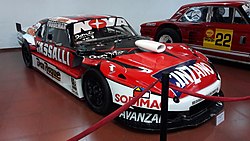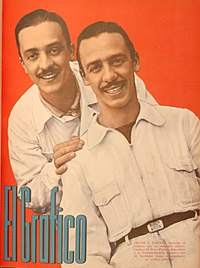Turismo Carretera
 | |
| Category | Stock cars |
|---|---|
| Country | |
| Inaugural season | 1937 |
| Drivers' champion | Mariano Werner |
| Makes' champion | Ford |
| Teams' champion | Fadel Guri Martinez Competición |
| Official website | ACTC.org.ar |
Turismo Carretera(Road racing,lit.,RoadTouring) is a popularstock car racingseries inArgentina,and the oldest auto racing series still active in the world. The series is organized byAsociación Corredores de Turismo Carretera.
History[edit]
The first TC competition took place in 1937 with 12 races, each in a differentprovince.FutureFormula OnestarJuan Manuel Fangio(Chevrolet) won the 1940 and 1941 editions of the TC. It was during this time that the series' Chevrolet-Ford rivalry began, with Ford acquiring most of its historical victories.
Until the 1960s, the majority of races were held on temporarily closed roads (hence the series' name). These improvised circuits would often present a combination of dirt and asphalt surfaces unlike those of dedicated race tracks, and in the early years consisted of both circuit races and stage races. The last street circuit event held by the series was the 1997 season-opener inSanta Teresita,with the championship phasing out road races on safety grounds.
During the 1960s the category began employing high-end technologies, with local manufacturers investing heavily for prestige.Ford Motor ArgentinaandChevroletwere main contenders, withDodgeto a lesser degree. The European brandRenault,which had merged withIndustrias Kaiser Argentinaand thus inherited theRamblerrange, was also a contender.
In the 1970s, the Sport Prototipo (modified cars in the Gran Turismo vein) category was spun off TC to allow TC to return to its stock-car roots which made it immensely popular with small-town audiences. The spin-off withered away slowly. A second spin-off wasTC 2000 Championshipin the 1980s which allowed the showcasing of the smaller cars most Argentines were driving, thus includingPeugeot,Renault,FiatandVolkswagen,and later,Japanesebrands as well. TC 2000 soon became as popular as TC itself.
In later years, and to preserve its main draw, TC has been clinging to the older models that have mostly gone out of use in Argentine roads, and incorporated imported engines. In 2024, the series will switch to modern Americanpony cars.[1]
Brands in TC still have huge fan bases, withFordandChevroletbeing the largest.General Motorsdecided to end manufacturingChevy Coupé SS(Chevrolet Nova) in Argentina in 1977. Dodge and IKA-Torino are the other two participants with wins in TC.
Pyramid[edit]
There are currently four tiers on the Turismo Carretera ladder. The top rung is Turismo Carretera itself, followed byTC Pistaas the second division (established in 1995),TC Mourasas the third division (established in 2004 and named after driverRoberto Mouras) andTC Pista Mourasas the fourth division (established in 2008). Pista Mouras is considered the first step for drivers from regional race series to compete nationally.
A fifth category,TC Pick Up,was introduced in 2017 as an alternative rung on the ladder whilst creating a platform for manufacturers to advertise theirlight commercial trucks.
| Tier | Championships | |
|---|---|---|
| 1 | Turismo Carretera | |
| 2 | TC Pista | |
| 3 | TC Mouras | TC Pick Up |
| 4 | TC Pista Mouras | TC Pista Pick Up |
Format[edit]
Championship[edit]
Since 2008, Turismo Carretera has held aNASCAR-style "playoff" format alongside its regular championship to decide the champion.
Called theCopa de Oro( "Gold Cup" ), the playoffs are typically held over the final five events of a season (three in theCOVID-affected2020 season). The top twelve drivers in the championship after the final round before the playoffs make the cut. All drivers start on zero points, however the championship leader will receive a bonus 15 starting points, and every driver that won an event 'Final' (see below) will receive an additional 8 starting points per win. Ahead of the final round of the season, the top three drivers in the regular standings that did not qualify for the playoffs will be admitted along with the points they scored over the previous four rounds (two in 2020). No bonus points will be awarded to these "last chance qualifiers".
Drivers that qualify for theCopa de Oroare differentiated from regular competitors by running gold numbers on the rear-passenger windows and gold paint on the front undertray.[2]
Event[edit]
In modern Turismo Carretera, there are "normal races" and "special races" in each season.
The "normal races" have a format of one qualifying session (held on Saturday) and four races (held on Sunday) per weekend. The first three races – calledSeries(Heats) – split the field into three separate groups, which are formed from the results of qualifying. The fastest qualifier occupies first place in Heat 1, the second-fastest qualifier occupies first place in Heat 2, and third in Heat 3. The fourth-fastest driver in qualifying occupies second place on the grid in Heat 1, and so on until the entire field is divided into three.[3]
Each heat race is a five-lap sprint and defines the grid positions for the final race (orFinal), usually held over 25 laps held in the afternoon. The winners of the three heats occupy the first three positions on the grid, in order of fastest to slowest race time. This process is then followed for the rest of the grid, with the order determined by first a drivers' heat position and then their race time. Drivers who did not finish on the lead lap in their heat race will be moved to the rear of the field for the Final, and their order will be determined by how many laps they complete in the Heats, followed by their race position and then their race time.[3]
In addition, there can be up to four "special races" (carreras especiales) held in the regular season before the playoffs. In 2023, three special races were held: one with a mandatory pitstop for refueling inLa Pampa,theCarrera de los MillionesinRafaelawith a special monetary prize for the winner, and theDesafío de las EstrellasinVillicumwhere the grid is determined by alotteryand there are two mandatory stops to change tyres and refuel. Additionally, there is a Special Races Tournament (Torneo de Carreras Especiales) that gives the winner the opportunity to qualify for the playoffs if they have not made it through via their position the regular season standings.[4][5]
Gallery[edit]
Circuits[edit]
The circuits in 2023:
- Autódromo Ciudad de Viedma
- Autódromo Parque Provincia del Neuquén
- Autódromo Enrique Freile
- Autódromo de Concepción del Uruguay
- Autódromo Termas de Río Hondo
- Autódromo Ciudad de Rafaela
- Autódromo Rosamonte
- Circuito San Juan Villicum
- Autódromo Oscar y Juan Gálvez
- Autódromo Rosendo Hernández
- Autódromo Juan María Traverso
- Autódromo Provincia de La Pampa
Active cars[edit]
- Ford Falcon(43 titles)
- Ford Mustang(from 2024)
- Chevrolet Camaro(from 2024)
- Chevrolet Coupé SS(22 titles)
- Dodge Challenger(from 2024)
- Dodge GTX Cherokee(currently powered by aChrysler Cherokeeengine) (10 titles)
- Torino Cherokee(currently powered by a Chrysler Cherokee engine) (5 titles)
- Torino TC 2024(from 2024)
- Toyota Camry 2022(since 2022)
- Toyota Camry 2024(since 2024)
The Dodge GTX and IKA Torino were originally equipped withSlant SixandTornadoengines respectively. In the mid-1990s, both moved to Chrysler Cherokee engines. The Toyota has exclusively run with a Cherokee engine since its original homologation in 2022.
Champions[edit]

Other active drivers[edit]
- Juan Pablo Gianini
- Julián Santero
- Gabriel Ponce de León
- Gastón Mazzacane
- Facundo Ardusso
- Camilo Echevarría
- Leonel Pernía
- Emiliano Spataro
- Camilo Echevarría
- Ricardo Risatti III
- Jonatan Castellano
References[edit]
- ^"La guía indispensable sobre la renovación del TC en 2024"(in Spanish). SoloTC. 7 July 2023.
- ^"REGLAMENTO GENERAL CAMPEONATO ARGENTINO DE PILOTOS AÑO 2022 CATEGORIA TURISMO CARRETERA FISCALIZADA POR LA C.A.F. DE LA A.C.T.C"(PDF)(in Spanish).Asociación Corredores de Turismo Carretera.Retrieved30 August2023.
- ^ab"ACTC - 07/02/2023 - Reglamento Campeonato TC 2023".actc.org.ar.Retrieved2023-09-21.
- ^Caltana, Ariel (2023-02-15)."Cuántas carreras especiales tendrá el TC en 2023 | SoloTC".SoloTC | Turismo Carretera(in Spanish).Retrieved2023-09-21.
- ^Caltana, Ariel (2023-09-21)."Cuatro ganadores complicados en la Copa de Oro del TC | SoloTC".SoloTC | Turismo Carretera(in Spanish).Retrieved2023-09-21.
External links[edit]
- (in Spanish)Official site
- (in Spanish)Information & HistoryArchived2005-08-18 at theWayback Machine
- (in Spanish)HistoryArchived2008-05-06 at theWayback Machine
- (in Spanish)Statistics, games, wallpapers





